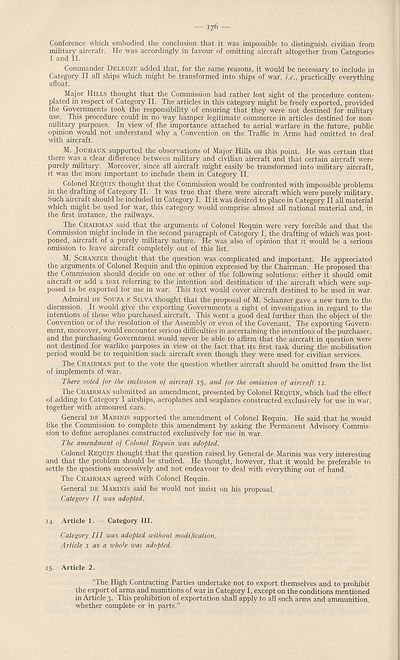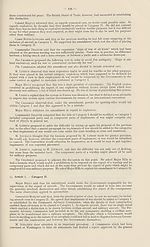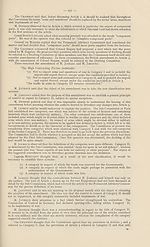Armament > Conference for the control of the international trade in arms, munitions and implements of war
(178)
Download files
Complete book:
Individual page:
Thumbnail gallery: Grid view | List view

176
Conference which embodied the conclusion that it was impossible to distinguish civilian from
military aircraft. He was accordingly in favour of omitting aircraft altogether from Categories
I and II.
Commander Deleuze added that, for the same reasons, it would be necessary to include in
Category II all ships which might be transformed into ships of war, i.e., practically everything
afloat.
Major Hills thought that the Commission had rather lost sight of the procedure contem¬
plated in respect of Category II. The articles in this category might be freely exported, provided
the Governments took the responsibility of ensuring that they were not destined for military
use. This procedure could in no way hamper legitimate commerce in articles destined for non¬
military purposes. In view of the importance attached to aerial warfare in the future, public
opinion would not understand why a Convention on the Traffic in Arms had omitted to deal
with aircraft.
M. Jouhaux supported the observations of Major Hills on this point. He was certain that
there was a clear difference between military and civilian aircraft and that certain aircraft were
purely military. Moreover, since all aircraft might easily be transformed into military aircraft,
it was the more important to include them in Category II.
Colonel Requin thought that the Commission would be confronted with impossible problems
in the drafting of Category II. It was true that there were aircraft which were purely military.
Such aircraft should be included in Category I. If it was desired to place in Category II all material
which might be used for war, this category would comprise almost all national material and, in
the first instance, the railways.
1 he Chairman said that the arguments of Colonel Requin were very forcible and that the
Commission might include in the second paragraph of Category I, the drafting of which was post¬
poned, aircraft of a purely military nature. He was also of opinion that it would be a serious
omission to leave aircraft completely out of this list.
M. Schanzer thought that the question was complicated and important. He appreciated
the arguments of Colonel Requin and the opinion expressed by the Chairman. He proposed tha
the Commission should decide on one or other of the following solutions: either it should omit
aircraft or add a text referring to the intention and destination of the aircraft which were sup¬
posed to be exported for use in war. This text would cover aircraft destined to be used in war.
Admiral de Souza e Silva thought that the proposal of M. Schanzer gave a new turn to the
discussion. It would give the exporting Governments a right of investigation in regard to the
intentions of those who purchased aircraft. This went a good deal further than the object of the
Convention or of the resolution of the Assembly or even of the Covenant. The exporting Govern¬
ment, moreover, would encounter serious difficulties in ascertaining the intentions of the purchaser,
and the purchasing Government would never be able to affirm that the aircraft in question were
not destined for warlike purposes in view oi the fact that its first task during the mobilisation
period would be to requisition such aircraft even though they were used for civilian services.
The Chairman put to the vote the question whether aircraft should be omitted from the list
of implements of war.
There voted for the inclusion of aircraft 15, and for the omission of aircraft 11.
The Chairman submitted an amendment, presented by Colonel Requin, which had the effect
of adding to Category I airships, aeroplanes and seaplanes constructed exclusively for use in war,
together with armoured cars.
General de Marinis supported the amendment of Colonel Requin. He said that he would
like the Commission to complete this amendment by asking the Permanent Advisory Commis¬
sion to define aeroplanes constructed exclusively for use in war.
The amendment of Colonel Requin was adopted.
Colonel Requin thought that the question raised by General de Marinis was very interesting
and that the problem should be studied. He thought, however, that it would be preferable to
settle the questions successively and not endeavour to deal with everything out of hand.
The Chairman agreed with Colonel Requin.
General de Marinis said he would not insist on his proposal.
Category II was adopted.
14. Article 1. — Category III.
Category III was adopted without modification.
Article 1 as a whole was adopted.
15. Article 2.
“The High Contracting Parties undertake not to export themselves and to prohibit
the export of arms and munitions of war in Category I, except on the conditions mentioned
in Article 3. This prohibition of exportation shall apply to all such arms and ammunition,
whether complete or in parts.”
Conference which embodied the conclusion that it was impossible to distinguish civilian from
military aircraft. He was accordingly in favour of omitting aircraft altogether from Categories
I and II.
Commander Deleuze added that, for the same reasons, it would be necessary to include in
Category II all ships which might be transformed into ships of war, i.e., practically everything
afloat.
Major Hills thought that the Commission had rather lost sight of the procedure contem¬
plated in respect of Category II. The articles in this category might be freely exported, provided
the Governments took the responsibility of ensuring that they were not destined for military
use. This procedure could in no way hamper legitimate commerce in articles destined for non¬
military purposes. In view of the importance attached to aerial warfare in the future, public
opinion would not understand why a Convention on the Traffic in Arms had omitted to deal
with aircraft.
M. Jouhaux supported the observations of Major Hills on this point. He was certain that
there was a clear difference between military and civilian aircraft and that certain aircraft were
purely military. Moreover, since all aircraft might easily be transformed into military aircraft,
it was the more important to include them in Category II.
Colonel Requin thought that the Commission would be confronted with impossible problems
in the drafting of Category II. It was true that there were aircraft which were purely military.
Such aircraft should be included in Category I. If it was desired to place in Category II all material
which might be used for war, this category would comprise almost all national material and, in
the first instance, the railways.
1 he Chairman said that the arguments of Colonel Requin were very forcible and that the
Commission might include in the second paragraph of Category I, the drafting of which was post¬
poned, aircraft of a purely military nature. He was also of opinion that it would be a serious
omission to leave aircraft completely out of this list.
M. Schanzer thought that the question was complicated and important. He appreciated
the arguments of Colonel Requin and the opinion expressed by the Chairman. He proposed tha
the Commission should decide on one or other of the following solutions: either it should omit
aircraft or add a text referring to the intention and destination of the aircraft which were sup¬
posed to be exported for use in war. This text would cover aircraft destined to be used in war.
Admiral de Souza e Silva thought that the proposal of M. Schanzer gave a new turn to the
discussion. It would give the exporting Governments a right of investigation in regard to the
intentions of those who purchased aircraft. This went a good deal further than the object of the
Convention or of the resolution of the Assembly or even of the Covenant. The exporting Govern¬
ment, moreover, would encounter serious difficulties in ascertaining the intentions of the purchaser,
and the purchasing Government would never be able to affirm that the aircraft in question were
not destined for warlike purposes in view oi the fact that its first task during the mobilisation
period would be to requisition such aircraft even though they were used for civilian services.
The Chairman put to the vote the question whether aircraft should be omitted from the list
of implements of war.
There voted for the inclusion of aircraft 15, and for the omission of aircraft 11.
The Chairman submitted an amendment, presented by Colonel Requin, which had the effect
of adding to Category I airships, aeroplanes and seaplanes constructed exclusively for use in war,
together with armoured cars.
General de Marinis supported the amendment of Colonel Requin. He said that he would
like the Commission to complete this amendment by asking the Permanent Advisory Commis¬
sion to define aeroplanes constructed exclusively for use in war.
The amendment of Colonel Requin was adopted.
Colonel Requin thought that the question raised by General de Marinis was very interesting
and that the problem should be studied. He thought, however, that it would be preferable to
settle the questions successively and not endeavour to deal with everything out of hand.
The Chairman agreed with Colonel Requin.
General de Marinis said he would not insist on his proposal.
Category II was adopted.
14. Article 1. — Category III.
Category III was adopted without modification.
Article 1 as a whole was adopted.
15. Article 2.
“The High Contracting Parties undertake not to export themselves and to prohibit
the export of arms and munitions of war in Category I, except on the conditions mentioned
in Article 3. This prohibition of exportation shall apply to all such arms and ammunition,
whether complete or in parts.”
Set display mode to:
![]() Universal Viewer |
Universal Viewer | ![]() Mirador |
Large image | Transcription
Mirador |
Large image | Transcription
Images and transcriptions on this page, including medium image downloads, may be used under the Creative Commons Attribution 4.0 International Licence unless otherwise stated. ![]()
| League of Nations > Armament > Conference for the control of the international trade in arms, munitions and implements of war > (178) |
|---|
| Permanent URL | https://digital.nls.uk/195384077 |
|---|
| Shelfmark | LN.IX |
|---|
| Description | Over 1,200 documents from the non-political organs of the League of Nations that dealt with health, disarmament, economic and financial matters for the duration of the League (1919-1945). Also online are statistical bulletins, essential facts, and an overview of the League by the first Secretary General, Sir Eric Drummond. These items are part of the Official Publications collection at the National Library of Scotland. |
|---|---|
| Additional NLS resources: |
|

